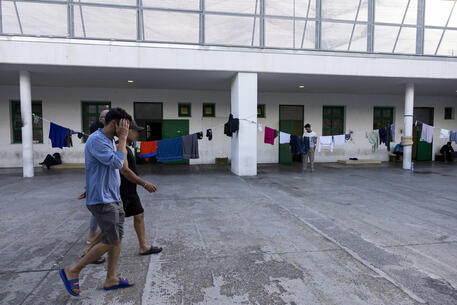(ANSA) - ROME, DEC 13 - The Council of Europe's Committee for
the Prevention of Torture and Inhuman or Degrading Treatment or
Punishment (CPT) criticized in a dossier published on Friday the
treatment and conditions of detention of foreign nationals held
at pre-removal centres (CPRs) in Italy.
The dossier in particular denounced alleged cases of
ill-treatment and excessive use of force by police officers and
criticized the "widespread practice" of giving migrants
unprescribed psychotropic drugs.
The CPT's findings included "very poor material conditions, the
absence of a regime of activities, the disproportionate security
approach, the variable quality of healthcare provision and the
lack of transparency of the management of CPRs by private
contractors", "calling into question" the application of such a
model by Italy in an extra-territorial setting, such as in
Albania, the report noted.
The dossier was compiled after visits carried out by CPT
officials between April 2 and 12 this year at four out of
Italy's nine CPRs, including the pre-removal centres in Via
Corelli in Milan, Gradisca d'Isonzo, Palazzo San Gervasio in
Potenza and Ponte Galeria in Rome.
The CPT said it "found several cases of alleged physical
ill-treatment and excessive use of force by police officers of
foreign nationals detained in the CPRs visited", usually
following a "disturbance or act of vandalism in the centres".
The dossier also highlighted "the absence of any rigorous and
independent monitoring of such interventions by the police and
the lack of accurate recording of injuries sustained by detained
persons or of any assessment as to their origin".
The Committee criticized what it described as "the widespread
practice" of administering "unprescribed psychotropic drugs
diluted in water" to migrants held at the centres that it
"documented at the Potenza CPR".
Moreover, it denounced "the practice of transporting foreign
nationals to a CPR while handcuffed in a police vehicle without
being offered food and water during journeys of several hours",
saying it "should be reviewed".
Other shortcomings identified "relate to the poor quality of
food provided to detained persons and the shortage of stocks of
toiletries", said the dossier.
Speaking about the activities offered at repatriation centres,
the body said CPR contractors invested "only minimal efforts to
offer a few activities of a purposeful nature", adding that "the
CPT noted that several criminal investigations against the
management of various CPRs had been opened".
"The CPT gained the distinct impression that the high rate of
critical events and violence recorded inside the CPRs was a
direct consequence of the disproportionate security
restrictions, the lack of individual risk assessments of foreign
nationals, and the fact that detained persons were in effect
provided with nothing to occupy their time", according to the
dossier, which called for "a full range of purposeful activities
to be introduced, particularly in light of the extension of the
period of detention up to a maximum of 18 months".
As part of legislation approved last year, migrants can be held
in pre-expulsion CPR centres for up to 18 months but can post a
'bail' of 5,000 euros in order to avert being detained.
The report also called for improved access to legal counsel for
foreign nationals.
"The CPT recommends that access to a lawyer be improved.
"Further, foreign nationals held in so-called locali idonei -
holding areas in National Police Headquarters (Questure) in
ports, airports and border crossings -, should be afforded the
necessary safeguards such as information on their rights, access
to a lawyer and notification of their detention to a third
party".
Overall, the CPT said it was "highly critical of the physical
layout and design of CPRs and in particular the carceral
environment, which could be considered as similar to those
observed by the Committee in the detention units accommodating
prisoners under special regime", citing as examples " triple
metal mesh screens on windows, and cage-like outdoor
facilities".
Later on Friday, interior ministry sources said the dossier was
based on "partial and incomplete information", recalling that
the Italian government on November 16 had already provided
detailed observations to respond to it.
The same sources stressed how all health provisions for foreign
nationals held at pre-repatriation centres, including the
administration of medicines, are prescribed by doctors and that
medical facilities are also present within CPRs.
They also said they were unaware of medication being improperly
given to guests, "a circumstance which has never been the object
of sentences issued by magistrates". (ANSA).
>>>ANSA/Council of Europe criticizes Italian migrant centres
'Migrants mistreated at repatriation hubs' says report
